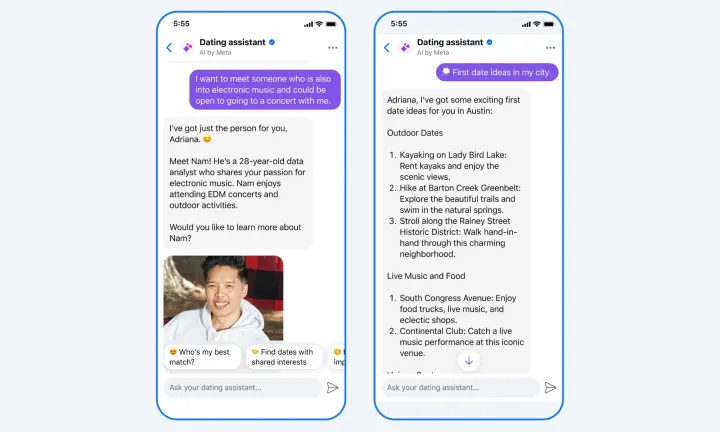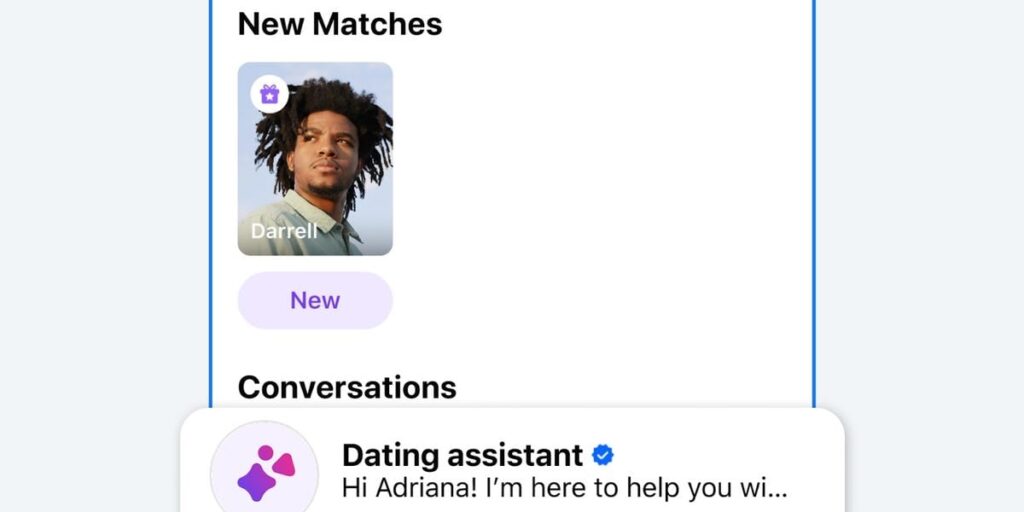Meta thinks the cure for your dating app burnout is… more algorithm. Facebook Dating just rolled out two AI features that promise to reduce “swipe fatigue” and make finding a partner feel less like speed-running a UX lab test. Whether that’s a fix or just a shinier slot machine is the real question.
First up is Dating Assistant, a chatbot baked into the Matches tab that lets you hunt for prospects with natural language instead of filters. Meta’s own example: “Find me a Brooklyn girl in tech.” You can also ask it for date ideas or profile tune-ups—because nothing says romance like outsourcing your personality to a stochastic parrot. It’s starting a gradual rollout in the US and Canada.
The second feature, Meet Cute, drops a single “surprise” pick into your queue each week based on a personalized matching algorithm. You can opt out, but the pitch is simple: stop drowning in choice, and let the machine throw one allegedly high-signal option at you. Think Hinge Standouts meets Bumble’s Spotlight, with Meta’s secret sauce stirred in.
If we are being honest, swipe fatigue is real. Years of gamified UX and bottomless feeds have pushed a lot of people past the point of diminishing returns. Curation, fewer taps, and better conversation prompts can help. A weekly “just talk to this one person” nudge could reduce paralysis by analysis. Constraint is underrated.
But the devil lives in the details—and Meta didn’t share many. How does Meet Cute decide who clears the bar? What signals are weighted? Does the Dating Assistant just translate your vibe into existing filters, or is it rummaging around your social graph and engagement data to play matchmaker? Transparency is table stakes if you want users to trust an algorithm in a space as intimate and high-stakes as dating.
The “Find me a Brooklyn girl in tech” line also tees up the creeper problem. Natural-language search makes hyper-specific targeting trivially easy—and while dating apps have always let you filter for basics, LLM-powered querying lowers the friction for less savory preferences too. Age and proximity filters are normal; using an AI concierge to inch toward discriminatory or fetishizing asks is… less ideal. There’s a thin line between personal preference and profiling-by-proxy, and a chatbot with zero social context won’t police it for you.
There’s another cost: authenticity. If Dating Assistant starts ghostwriting profiles and first messages at scale, we’re going to be chatting with each other’s robots until one of them accidentally schedules drinks. Tools that help you be clearer are great; tools that homogenize everyone into the same five “witty” openers and two résumé-ready bios are not. At minimum, Meta should consider an “AI-assisted” label for content the bot drafts—both to set expectations and to disincentivize the future of LLM-laundered personalities.
Strategically, none of this is exactly novel. Hinge already serves up curated daily picks. Tinder’s tested AI photo selection. Bumble leans on machine learning for safety and spam filtering. The difference is Meta’s data gravity and distribution. Facebook Dating lives inside Facebook proper, which means Meta can iterate fast, cross-promote, and—if it’s willing to make the case—use lightweight social-graph context in a way competitors can’t. That could be a cheat code for quality, or just a way to make rejection more interconnected. Your mileage will vary.
There is one potential bright spot: choice architecture. If Meta uses Meet Cute to impose gentle constraints—one premium match per week, clearly explained “why you’re seeing this” notes, and easy controls to refine results—it might tame the worst parts of the infinite swipe treadmill. But that requires design discipline and transparency. If it’s just another black box and a dopamine drip, the fatigue will be right where you left it.
Privacy is the elephant in the room. Even if these features launch with narrow permissions, the incentive will always be to hoover more signals to claim better accuracy. That trajectory demands guardrails now, not after the growth team hits its targets. Users should get:
Clear opt-ins for any data used beyond standard profile fields.
“Why am I seeing this?” explanations for Meet Cute picks.
A toggle to exclude AI-authored content from suggestions and prompts.
Easy audit and deletion of AI interaction history.
As for market impact: Facebook Dating has never been the main character in Meta’s product lineup. It launched in 2019 and has struggled to break through against Tinder, Bumble, and Hinge. These features won’t instantly change that story, but they are a decent reframing. If they can make the app feel less like a casino and more like a concierge, that’s a win. If they turn it into a layer cake of opaque scoring and AI small talk, people will bounce.
Bottom line: an AI helper can reduce friction, but it can’t invent chemistry—and it shouldn’t be allowed to bulldoze consent, taste, or context in the process. Meta wants to swap exhausting choice for guided discovery. Done thoughtfully and transparently, that’s useful. Done opaquely, it’s just more algorithm standing between you and a human being.



No Comments